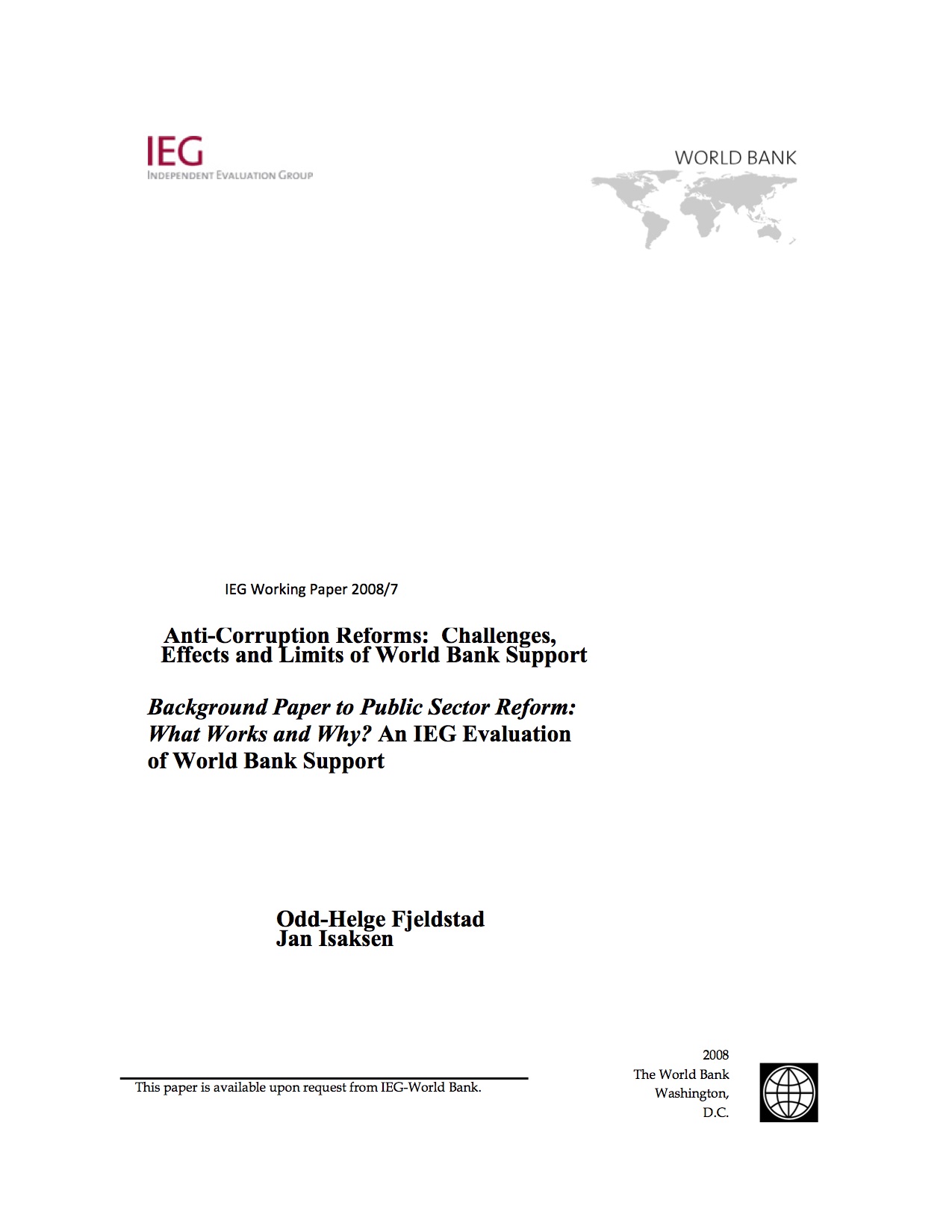
Anti-Corruption Reforms: Challenges, Effects and Limits of World Bank Support
Publication Year: 2008 / Sources: The World BankThis study compares the evolution of the state-of-the-art in research and analysis of anti- corruption and transparency with World Bank practice. The first part of the paper reviews the theoretical and empirical approaches that have influenced the World Bank’s and the donor community’s thinking on how to diagnose and fight corruption. Also covered are interventions and diagnostic tools that have been developed to improve governance and assess corruption, as well as recent Bank-supported international initiatives to curb grand corruption. Thereafter, the paper analyzes experiences from the Bank’s engagement in anti-corruption, drawing on the results of 19 country case studies covering developing and transitional countries. From the country cases it appears that anti-corruption measures are too often proposed by the Bank without considerations of the political economy and without clear strategies to win the support of a critical mass of key leaders who would help overcome the inevitable opposition of vested interests.
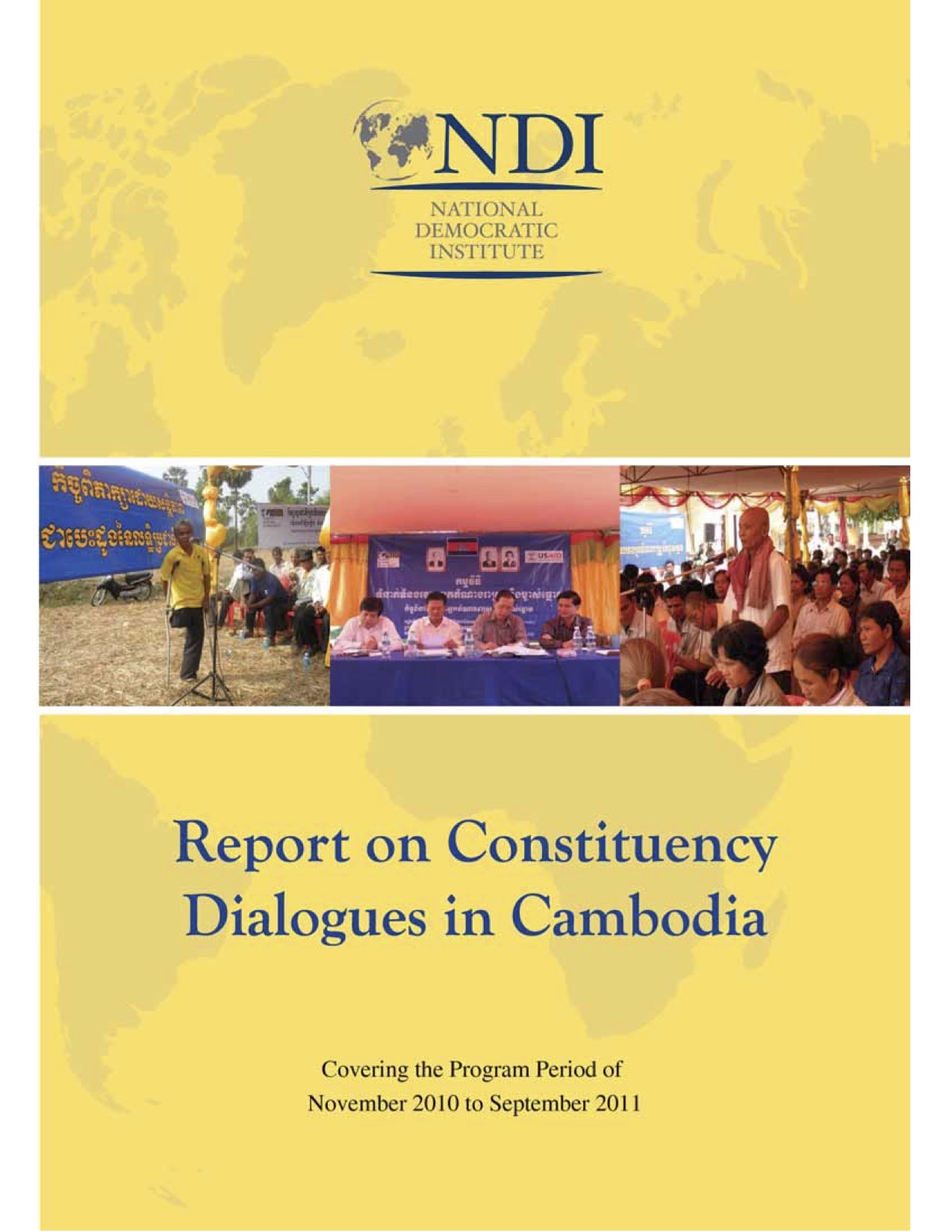
Report on Constituency Dialogues in Cambodia
Publication Year: 2011 / Sources: National Democratic Institute (NDI)More than 11,000 citizens (almost 50 percent of them women) and 35 national legislators (including seven women) attended the 24 constituency dialogues between November 2010 and September 2011. Across 12 provinces, dialogue participants echoed the same three problems affecting their lives: land conflicts; infrastructure and irrigation needs; and corruption and unequal enforcement by local authorities. Inequity was the underlying theme of these problems, and participants expressed their concern that the rich and powerful received all the benefits – land, development, and justice. Across provinces, people reported the pervasive influence of money on all aspects of life and the sense that they were losing their country to foreign companies and private interests. One participant described how government policies “always favored rich people” and asked, “Do rich businesspeople control the government or does the government control businesspeople?”
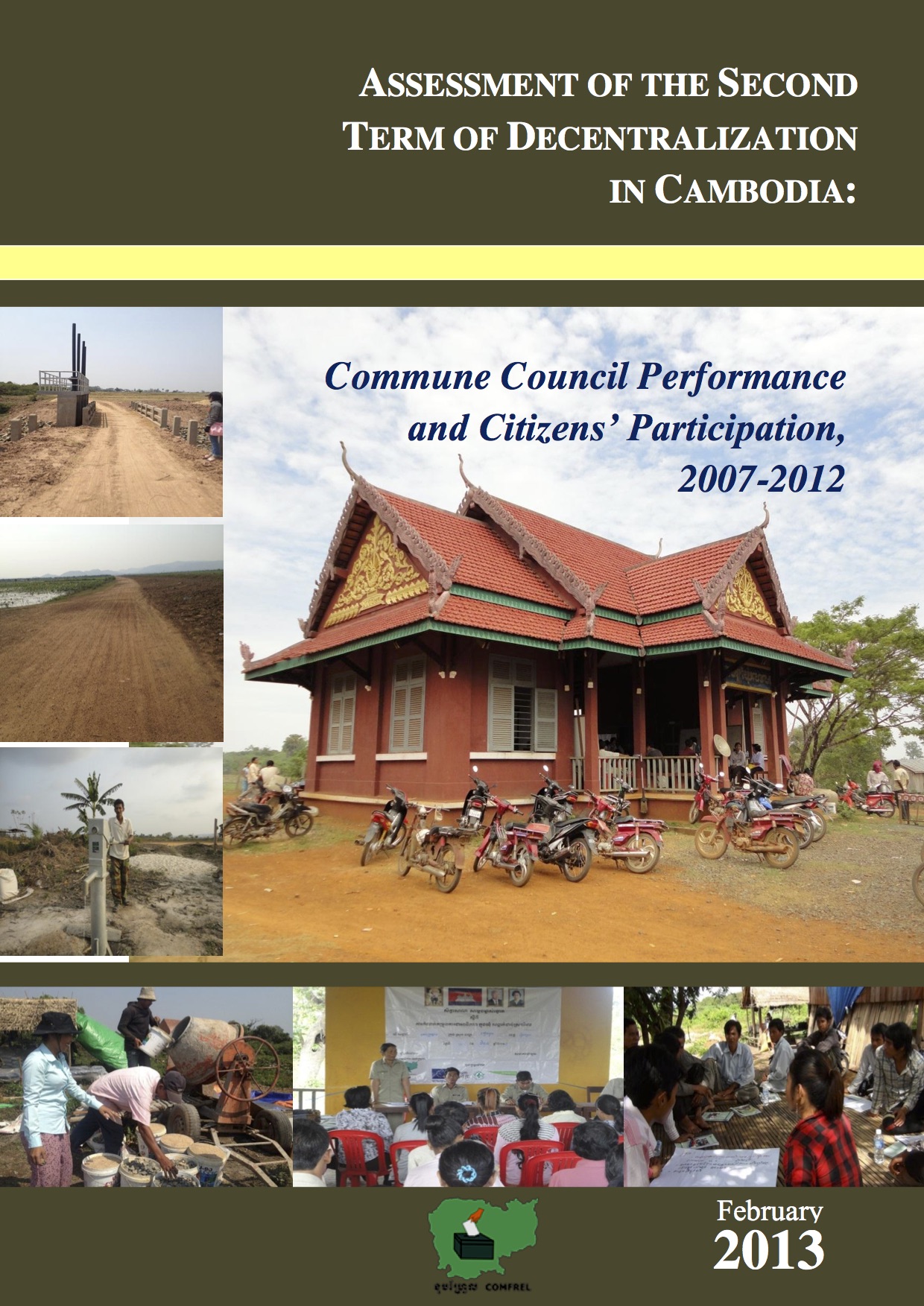
Assessment of the Second Term of Decentralization in Cambodia: Commune Council Performance and Citizens’ Participation, 2008-2012
Publication Year: 2013 / Sources: Committee for Free & Fair Elections in Cambodia (COMFREL)To contribute to the promote decentralization and local governance, COMFREL conducted an assessment of the first term of decentralization for the period (2002-2007). As another follow-up study, COMFREL also conducted the assessment of the second mandate of D&D. This study aims to review the progress of current implementation of decentralization reform and assess the performance of commune councilors and citizens‟ participation in the second term of decentralization (2007-2012).
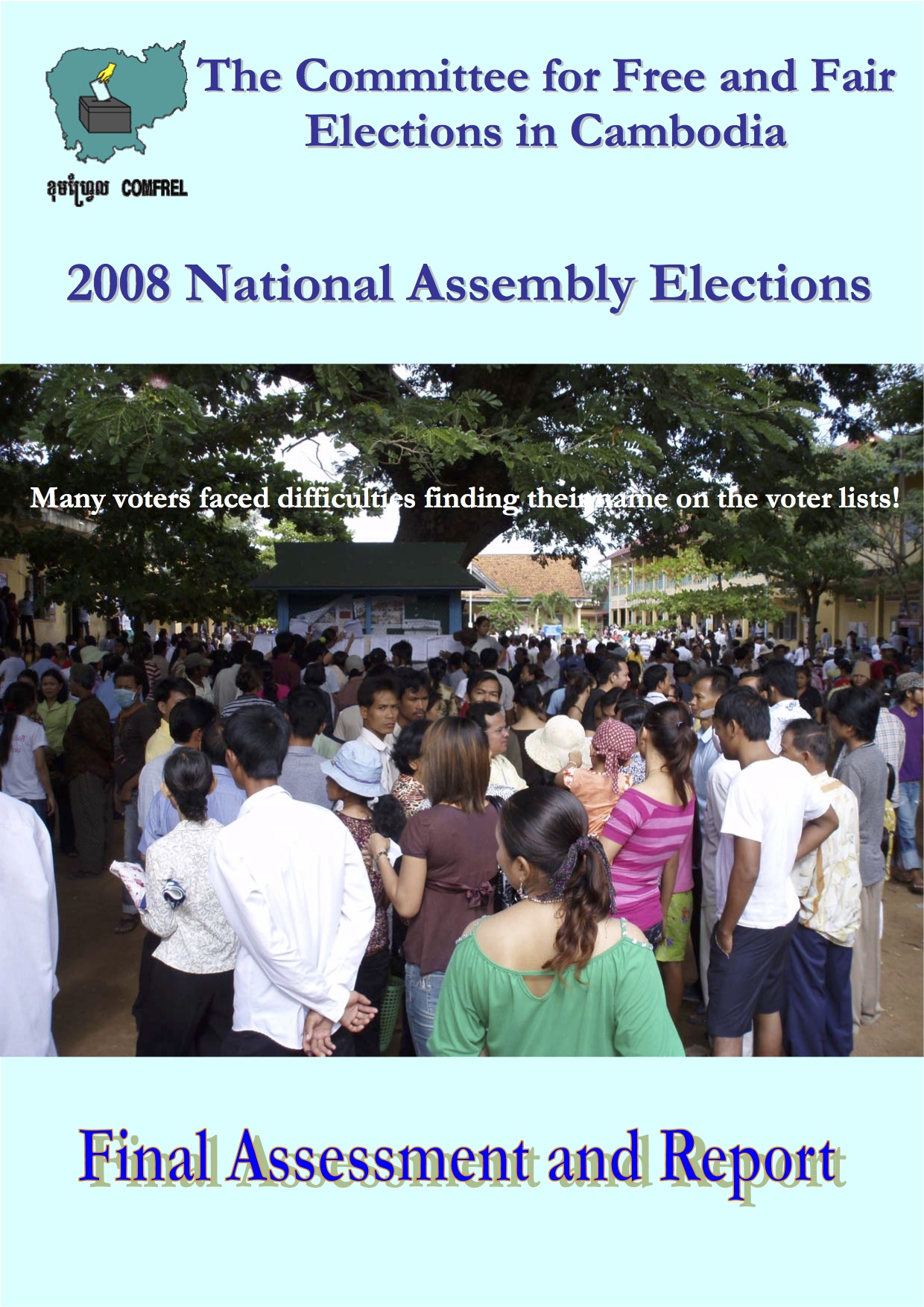
Final Assessment and Report on the 2008 National Assembly Elections
Publication Year: 2008 / Sources: The Committee for Free and Fair The Committee for Free and Fair Elections in Cambodia Elections in Cambodia (COMFREL)This report on the 2008 National Assembly elections includes findings, analysis, overall assessment and recommendations, as a compilation of COMFREL’s reports and statements published prior to election campaign, polling and immediately post-election periods, as well as an analysis of the election results. As with previous reports, analysis and recommendations seek to advance the debate on the reform and promotion of free and fair elections in Cambodia.
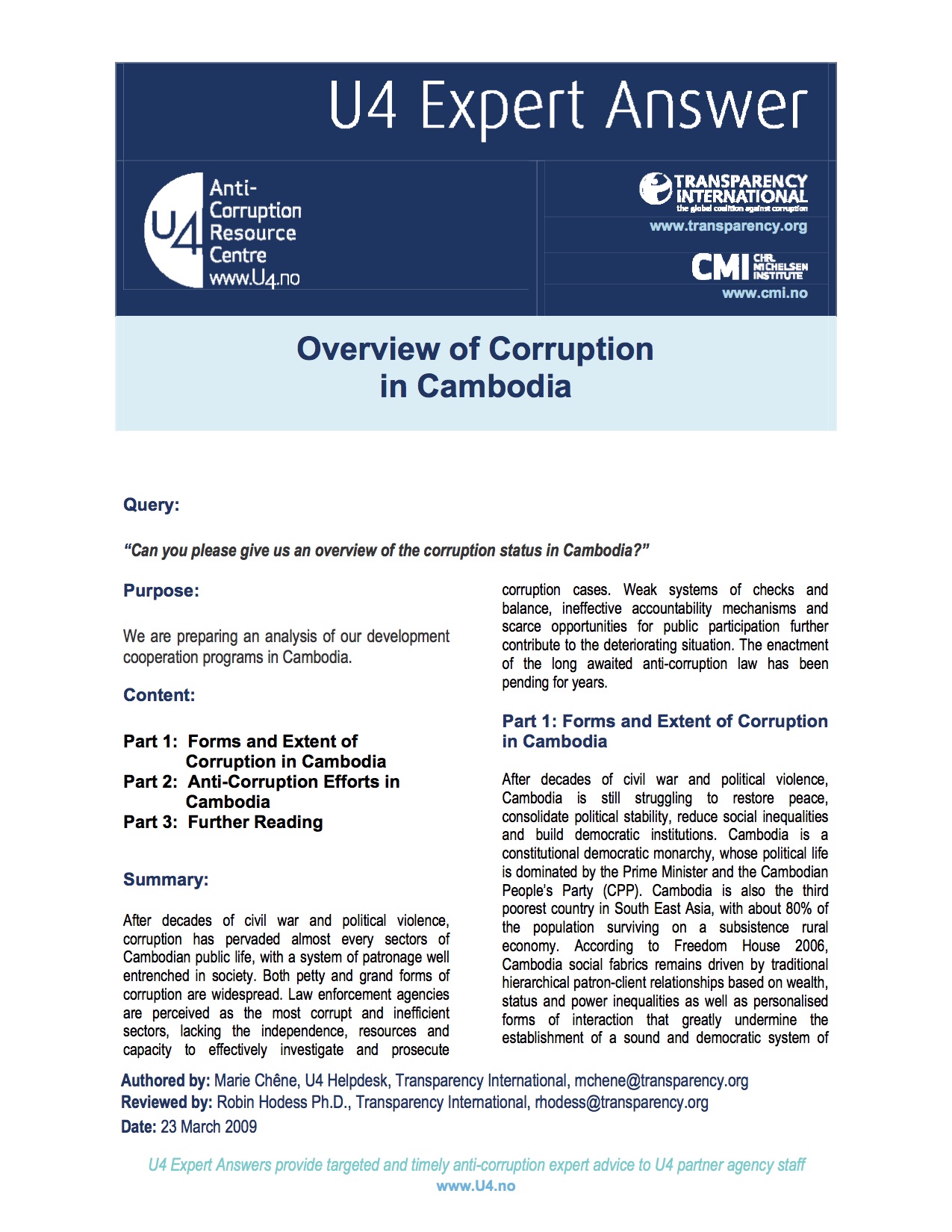
Overview of Corruption in Cambodia
Publication Year: 2009 / Sources: U4 Expert AnswersWe are preparing an analysis of our development cooperation programs in Cambodia.
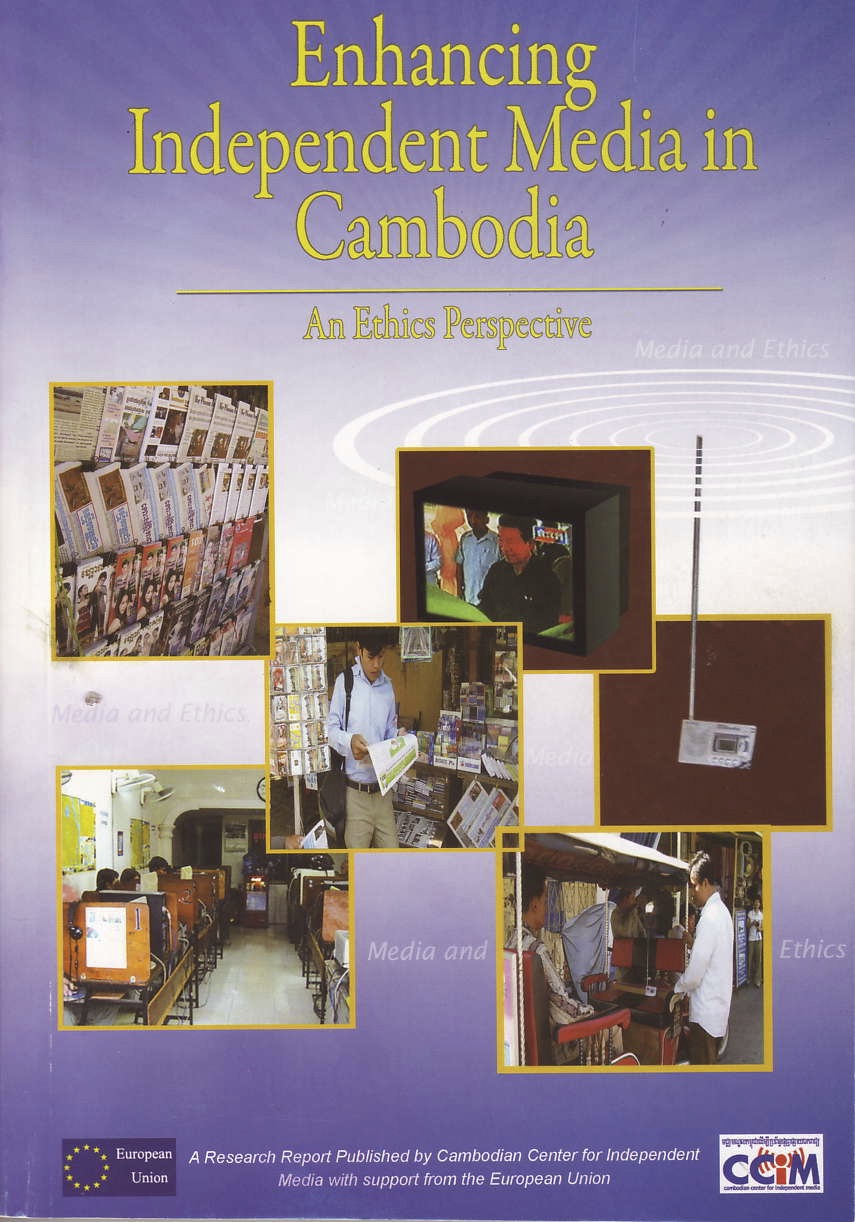
Enhancing Independent Media in Cambodia
Publication Year: 2009 / Sources: Cambodian Center for Independent MediaTo strengthen journalists’ practice of professional ethics in Cambodia, the Cambodian Center for Independent Media (CCIM) is initiating a project in 2009 titled “Enhancing Independent Media in Cambodia,” with generous funding from the European Union. This report comprises the first phase of that project. It aims to identify, analyze, and offer solutions to the ethical dilemmas facing Cambodian journalists.
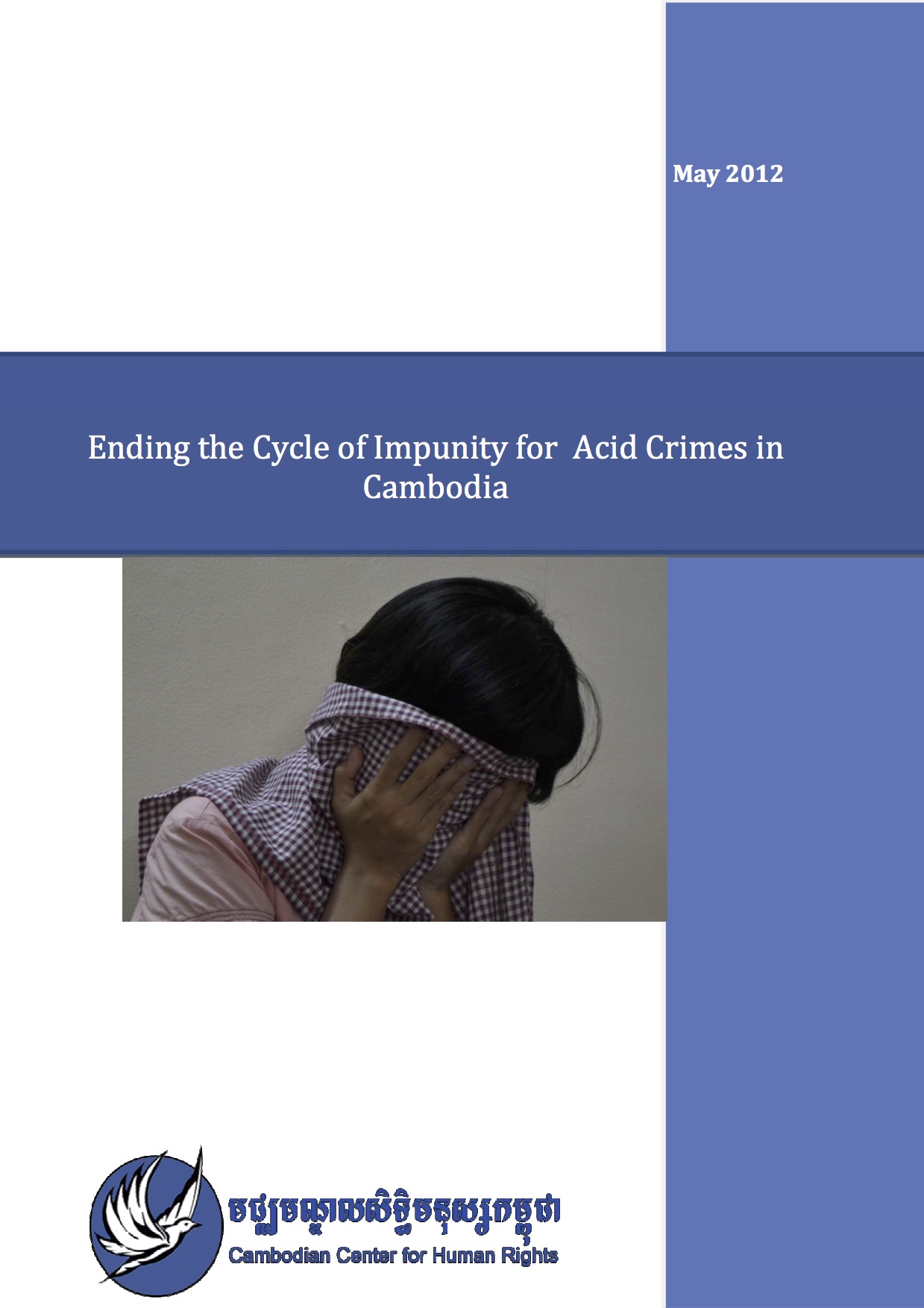
Ending the Cycle of Impunity for Acid Crimes in Cambodia
Publication Year: 2012 / Sources: Cambodian Center for Human Rights (CCHR)In Cambodia a culture of impunity surrounds acid violence. In the majority of cases offenders escape trial and conviction for these heinous crimes. The advent of a new Acid Law has been seen as a means of curbing the problem of acid violence. However, the fact that the perpetrators of the three abhorrent acid crimes committed so far this year – of which we know of – continue to be at large emphasizes that for the new legislation to have an impact there needs to be a fundamental shift in the manner in which crimes are investigated and how acid cases are tried. Without this shift, the effect of the new law will be negligible and impunity will continue. The purpose of this Report is to assist the Royal Government of Cambodia (the “RGC”), its ministries, the police and the judiciary by examining the failings and obstacles that victims face at the reporting, investigating and trial stages of the criminal justice process that feeds the cycle of impunity that perpetuates the problem of acid violence.
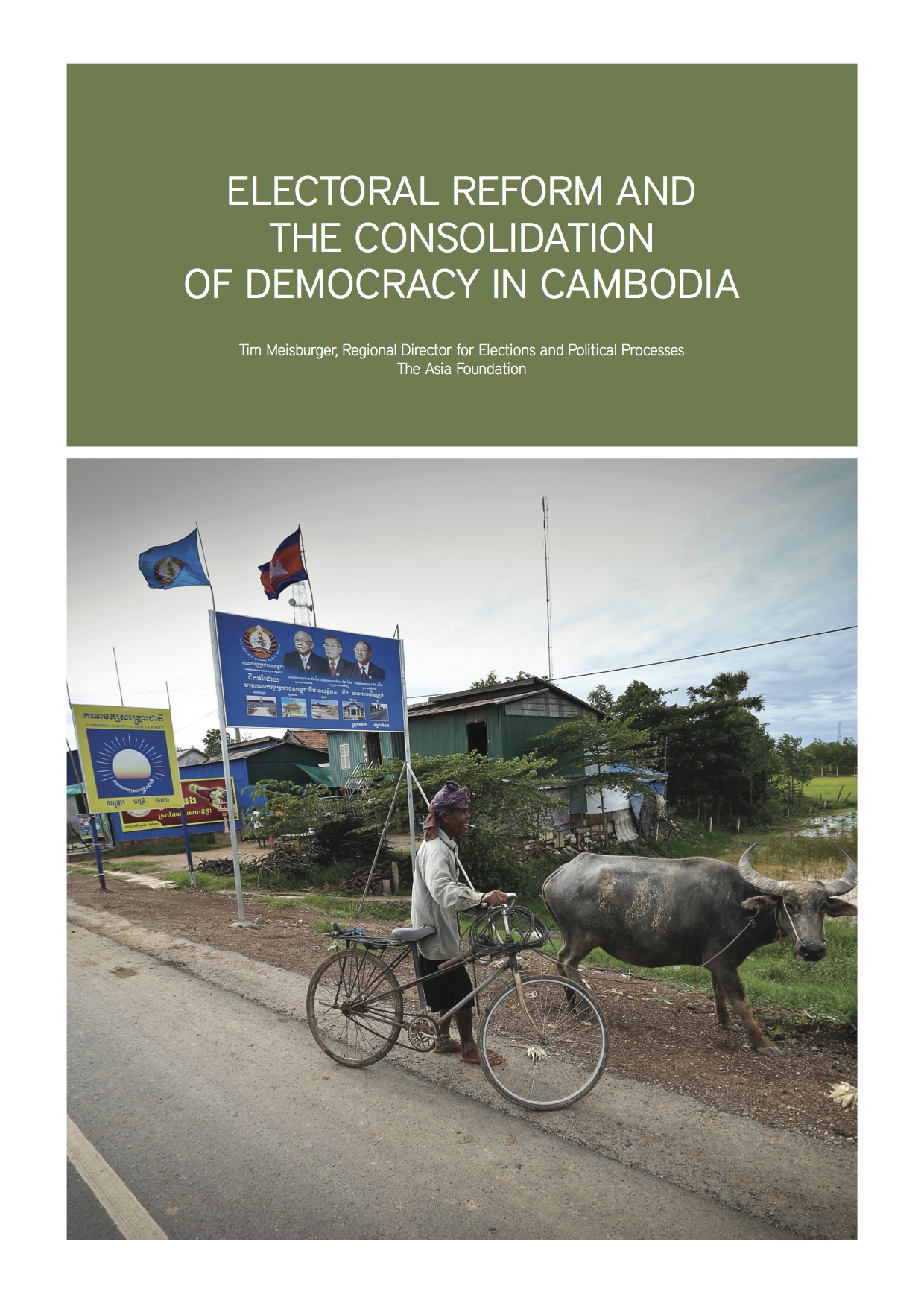
Electoral Reform and the Consolidation of Democracy in Cambodia
Publication Year: ---- / Sources: The Asia FoundationFollowing the national elections on July 28, 2013 the Cambodia National Rescue Party (CNRP) rejected the results, claiming widespread irregularities in the election process. The CNRP has since said it would not take its seats in National Assembly until there is significant election reform. The political deadlock was coupled with months of demonstrations from CNRP, and intensified by demonstrations by other aggrieved sectors, such as garment workers and victims groups protesting human rights abuses.
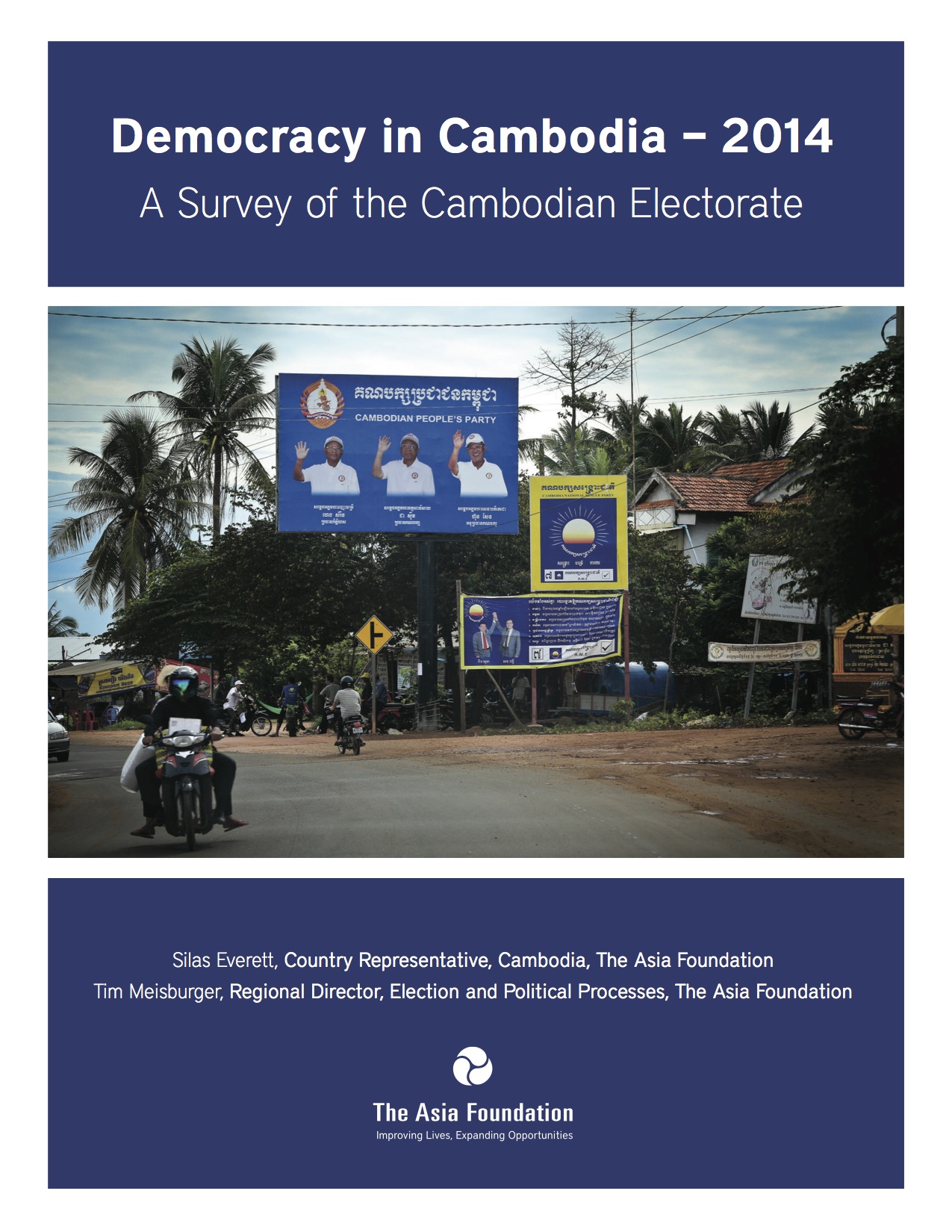
Democracy in Cambodia – 2014 A Survey of the Cambodian Electorate
Publication Year: 2014 / Sources: The Asia FoundationDemocracy in Cambodia – 2014: A Survey of the Cambodian Electorate is The Asia Foundation’s third national public opinion poll on democracy in Cambodia. The aim of this nationally representative survey, a follow-up to polls conducted in 2000 and 2003, is to assess attitudes and priorities of the voting public that may contribute to or constrain democratic reforms.
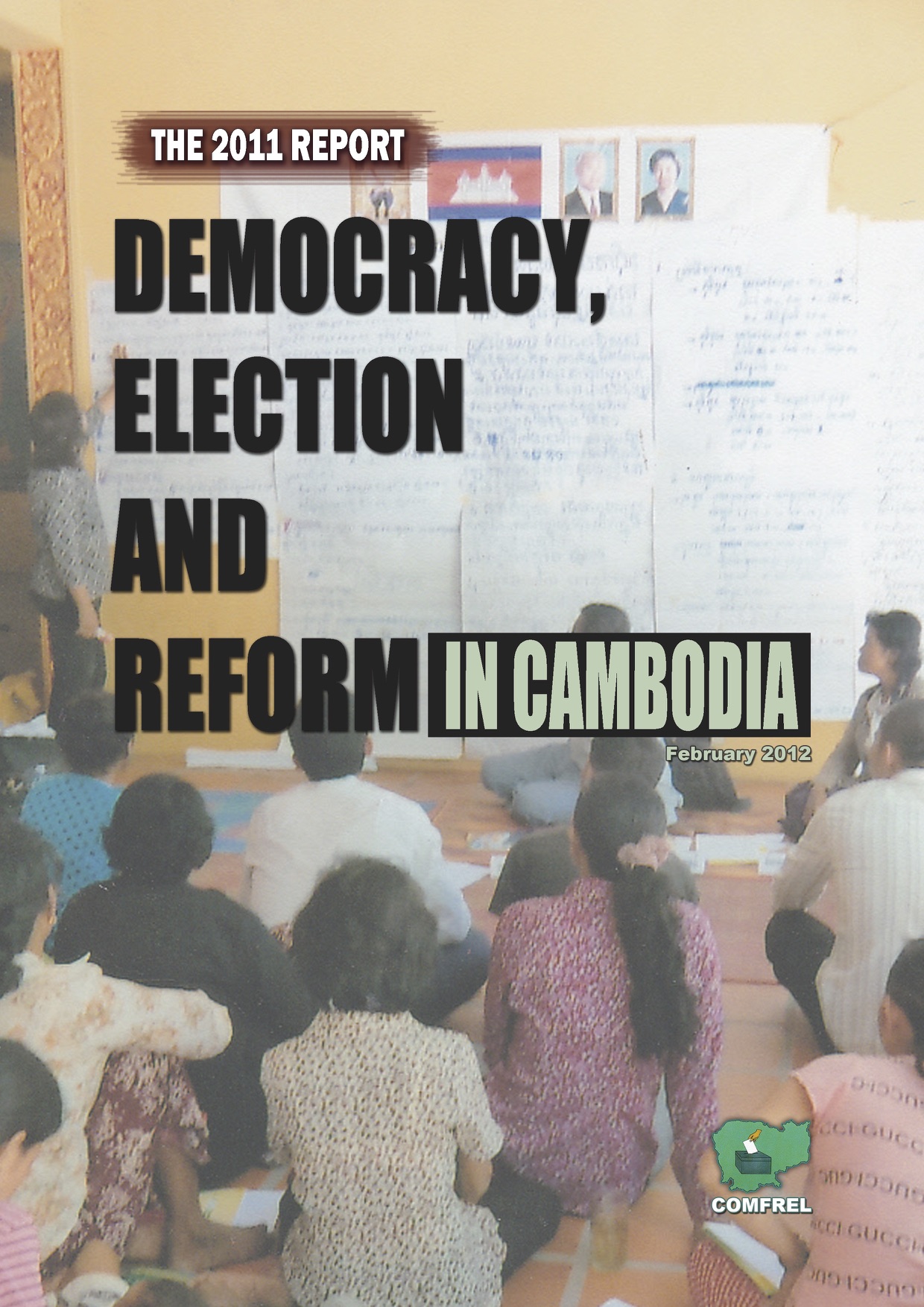
Democracy, Election and Reform in Cambodia
Publication Year: 2012 / Sources: Committee for Free and Fair Elections in Cambodia (COMFREL)The report first analyzes the state of democratic governance on the base of the principle of separation and limitations of power. This analysis includes parliamentarianism, the rule of law and government accountability and transparency. Afterwards follows an analysis of the state of democratic elections. Since in 2012 no elections were held, the report concentrates on potential electoral reforms, the annual voter registration and prospects for the senate elections in 2012. Thereafter follows an analysis of the state of democratic competition in Cambodia. In this part will be assessed, if there is an equitable access to media and state resources for all political parties. Moreover the analysis will look into the role of the political discourse in 2011 for the democratiza- tion process. This follows an assessment of the state of democratic participation including an as- sessment of the freedoms of expression, assembly and association. Special focus will be given to the role of women in the democratization process. Moreover results of a COMFEL survey concerning citizen’s political participation will be analyzed. The report concludes with recommendations and perspectives to the question how democratization can be further advanced and sustained in future.
